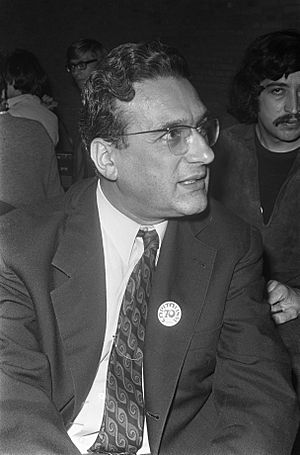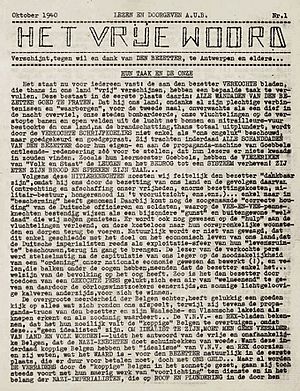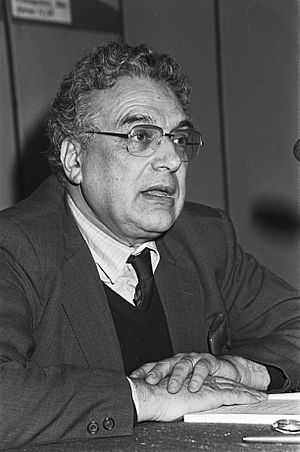Ernest Mandel facts for kids
Ernest Ezra Mandel (born April 5, 1923 – died July 20, 1995) was a Belgian economist, activist, and Holocaust survivor. He was also known by other names like Ernest Germain. During World War II, he bravely fought against the Nazis in the underground resistance when they occupied Belgium.
Contents
Ernest Mandel's Early Life
Ernest Mandel was born in Frankfurt, Germany. His parents, Henri and Rosa Mandel, were Jewish immigrants from Poland. His father was part of a socialist group called the Spartacist League. When he was young, Ernest joined a global socialist movement called the Fourth International in Antwerp, Belgium. His university studies were stopped when the German forces closed the university.
Fighting in World War II
During World War II, even as a teenager, Ernest joined the Belgian Trotskyist group. This group was part of the resistance against the Nazis. He was arrested twice but managed to escape. He also survived being held in a German concentration camp called Dora.
After the war, he became a leader in the Fourth International. He was known for his clear writing style and as a strong debater. He wrote for many newspapers and news agencies in the 1940s and 1950s. He even publicly debated the ideas of Marxism with Joop den Uyl, who later became the Prime Minister of the Netherlands.
Ernest Mandel's Work and Ideas
After 1946, Ernest Mandel became a key leader of the International Secretariat of the Fourth International. He joined the Belgian Socialist Party and became editor of a socialist newspaper. He was also involved with trade unions. He and his friends were later removed from the Socialist Party because they disagreed with some of its decisions, like working with other parties and accepting laws against strikes.
In 1963, he helped bring together different parts of the Fourth International. Until his death in 1995, Mandel remained a very important leader and thinker for this group.
Working with Che Guevara
In 1962, Mandel published a big book called Marxist Economic Theory. After reading it, Che Guevara invited Mandel to Cuba. They worked closely together on economic planning for Cuba.
Mandel went back to university and earned a PhD in 1972. He then became a lecturer at the Free University of Brussels.
Travel and Visa Challenges
From 1968, Mandel became a well-known public speaker. He traveled to universities in Europe and America to talk about socialism and revolution.
However, he was officially banned from several countries, including West Germany, the United States, France, and Australia. In 1969, the US government denied him a visa. They said he promoted "world Communism." Even though he had been allowed to visit before, and many American scholars supported his right to speak, the US Supreme Court upheld the ban in 1972.
In his later years, Mandel spoke out for intellectuals who faced political problems. He also pushed for cancelling the debts of developing countries. He traveled to Russia to share his ideas about democratic socialism and continued to support the idea of revolution until he died.
Ernest Mandel's Writings
Ernest Mandel wrote about 2,000 articles and 30 books in several languages. During World War II, he helped edit an underground newspaper called Het Vrije Woord.
He saw it as his job to share the ideas of classical Marxist thought with a new generation. He wanted to explain these ideas clearly, especially after they had been changed or misunderstood during the time of Stalinism and the Cold War. Many scholars and activists learned a lot from his writings. He tried to combine new, creative thinking with sticking to the main ideas of Marxism.
Parametric Determinism
Parametric determinism is a way of understanding how history unfolds. Ernest Mandel developed this idea. It's a part of Karl Marx's idea of historical materialism, which looks at how societies change over time.
Mandel explained that history is not just a straight line where everything is decided beforehand. Instead, it's like a path with several possible outcomes. He said, "Men and women indeed make their own history." This means that while there are certain limits or "parameters" to what can happen, people's actions and choices play a big role in deciding the future.
Making History: Choices and Limits
A common question in history is: How much of what happens is due to people's free choices, and how much is due to forces beyond their control?
Mandel suggested that in any situation, some things are beyond our control. These are like "parameters" or fixed conditions. For example, the physical world or the way society is set up can limit what we can do. The past is also a fixed parameter; we can't change what already happened.
However, within these limits, people still have choices. They can think, make decisions, and act. These choices might not be perfectly logical, but they are not random either. As Karl Marx said, "People make their own history, but they do not make it as they please; they do not make it under self-selected circumstances, but under circumstances existing already, given and transmitted from the past."
This means that history is a back-and-forth interaction. It's shaped by what people do and the conditions they face.
What This Means for History
Mandel's idea has several important points:
- Partly Decided, Partly Open: At any time, some historical outcomes are already set by past events, but others are uncertain. They depend on the choices people make now.
- Realistic Options: While some actions are impossible, people always have a limited number of realistic choices. This allows experts to guess what might happen in the future.
- Choices Change the Future: When important choices are made, they change the "parameters" for the future. This can close off some possibilities and open up new ones.
- Predicting the Future: With enough experience and knowledge, it's possible to predict some things about the future with good accuracy.
- Understanding the Past: When we study history, we need to figure out what happened because of human choices and what happened because of the circumstances.
- Learning from History: The main reason to study history is not to praise or blame, but to learn from past experiences. History is like a "laboratory" that shows us what worked and what didn't. This helps us understand the present and make better choices for the future.
- No Fixed Plan: Mandel, like Marx, believed that history doesn't have a grand, fixed plan or purpose. It's people who make history by pursuing their goals, but they do so within certain limits.
How We See Things
Mandel also talked about how our understanding of what's possible can be influenced by our beliefs and feelings. We might overestimate or underestimate our ability to change things. Sometimes, we might think something is impossible ("God's will") when, in reality, it could have been changed if people had tried.
He also noted that human actions can have unexpected results, sometimes the opposite of what was intended. If many people believe something, even if it's not true, that belief can also influence what happens.
Death and Legacy
Ernest Mandel passed away at his home in Brussels in 1995 from a heart attack.
He is best remembered for making basic Marxist ideas easy to understand. He also wrote important books about late capitalism and Long-Wave theory, which looks at long cycles in economic development. Mandel was a leading figure in the Trotskyist movement, guiding it with his ideas and leadership. Even though some critics said he was too soft on Stalinism, he remained a strong Trotskyist thinker. He believed that capitalism, while changing, still faced problems and crises.
See also
 In Spanish: Ernest Mandel para niños
In Spanish: Ernest Mandel para niños
- Determinism
- Dialectics
- Historical materialism
- Philosophy of History
- Social constructionism




